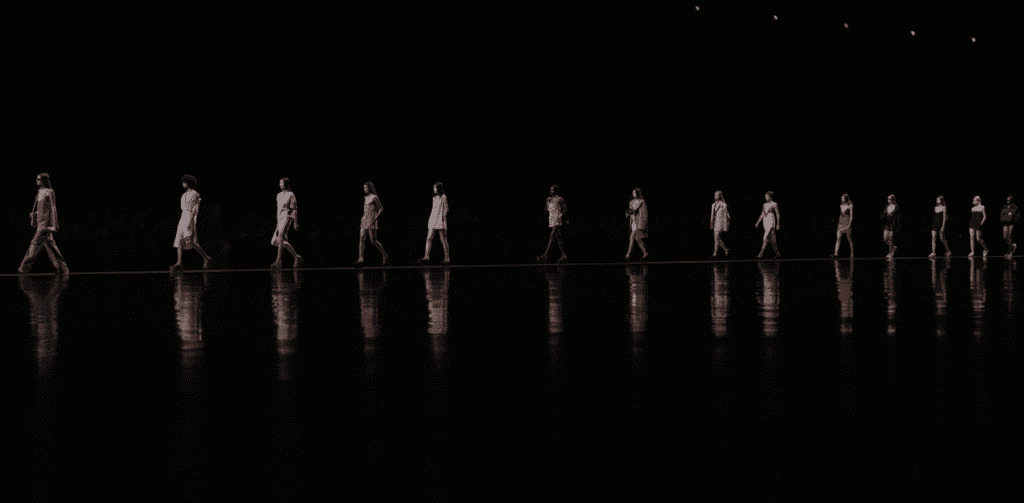All eyes are on Gucci as Sabato De Sarno made his creative directional debut for the Italian fashion brand in Milan on Friday. Not only are creative reinventions like this “fraught with risk,” as Bernstein’s Luca Solca put it earlier this year, the stakes are especially high given the sheer size of Gucci – it is one of the segment’s > €10 billion mega-brands and its corresponding importance to Kering. At the same time other factors are ratcheting up the pressures, including enduring management reshuffling at Kering, including former Gucci CEO Marco Bizzarri’s exit, the repositioning of Francesca Bellettini who will now have all of Kering brands’ CEOs reporting to her in addition to staying in her chief executive role at Yves Saint Laurent, etc.

Beyond that, Reuters pointed to the fact that despite being “one of the biggest success stories in fashion in recent years,” Kering’s largest brand has “struggled to capitalize on a post-pandemic rebound that fueled surging sales at rivals, such as LVMH-owned Louis Vuitton and Dior.” And still yet, there is the state of the luxury market – which is not making the turnaround that brands had hoped for. The consensus among leaders at fashion/luxury’s big groups is that if 2023 has been difficult, 2024 is going to be even worse – making it go time if brands want a chance to right their ships ahead of further slowdown.
40-year-old De Sarno’s debut is particularly important in this sense, as Gucci is suffering from brand fatigue and needs something new – and big – to regain consumers’ attention and interest, especially as many are expected to continue to pull back on their spending.
For a deeper dive into The Time-Sensitive Business Case for Gucci’s Revamp, you can find that right here.
– Kadrey v. Meta Platforms: Meta is looking to escape the generative AI-centric copyright infringement & DMCA lawsuit that Sarah Silverman and co. filed against it. At a high level, Meta argues in a motion to dismiss that the Ps fail to plead that its models are infringing derivative works (due, in part, to a lack of substantial similarity) & to plead vicarious infringement because they fail to allege direct infringement, the requisite control & the requisite financial interest.
– Plaintiffs P.M., K.S., et al. v. OpenAI LP, et al: A group of unnamed plaintiffs have voluntarily dismissed their privacy-centric claims against OpenAI & Microsoft. (More about that case here.)
– Rhode-NYC, LLC v. Rhodedeodato Corp. et al: Hailey Bieber & her brand Rhode seem to have settled the reverse confusion case waged against it by an unrelated fashion brand called Rhode – which is both older and smaller. In a joint motion to stay, the parties alerted the court that they have reached “an agreement on all core terms of a resolution.” (More about that case here.)
– EEOC v. Walmart: The EEOC is suing Walmart for allegedly violating Title VII of the Civil Rights Act when it subjected female employees to sexual harassment & fired a female employee in retaliation for reporting the harassment.
– FTC v. Amazon: The FTC has named 3 senior Amazon executives in an amended complaint in its case against the company for its years-long effort to enroll consumers into its Prime program w/o their consent while knowingly making it difficult for consumers to cancel their Prime subscriptions.
– FTC v. U.S. Anesthesia Partners: And in another FTC action worth noting (even if it’s not fashion or retail-related), the agency has brought its first antitrust lawsuit under chair Lina Khan challenging serial acquisitions by private equity firms.
In its latest brand valuation ranking, Brand Finance focuses on the “world’s most valuable apparel companies,” with Nike taking the top spot on the list for yet another year. Brand Finance notes that “strong performances from sports apparel brands, with New Balance making the top 50,” French fashion house Celine was named the fastest-growing apparel brand & iconic luxury labels remain resilient amidst challenges.

Le Petit Lunetier has raised $4M in equity funding from Singapore-based eyewear retailer Neso Brands.
Darrow has raised $35M in a Series B round. The co. “leverages generative AI to “ingest large amounts of publicly available documents to search for class action litigation potential.”
Paxton AI – which aims to “lighten the load of legal research and drafting” – has raised $6M in a Seed round.
Metaverse data intelligence startup GEEIQ has raised $8.2M in a Series A round.
Aptean has acquired Apparel Business Systems, a provider of enterprise resource planning software for fashion & apparel manufacturers, wholesalers & distributors.
Akeneo has acquired AI-driven platform Unifai to enhance its product cloud offering and elevate global product experiences.
Mimbi – which enables brands to measure ROI for their advertising campaigns on e-commerce sites – has raised €1.5M in a Seed round
Writer – an enterprise Generative AI SaaS writing-assistant tech. provider – has raised $100M in a Series B round.